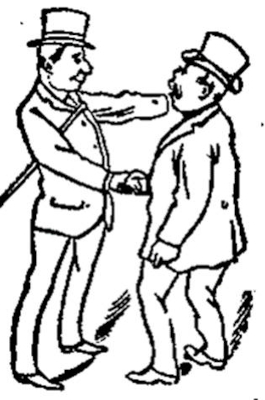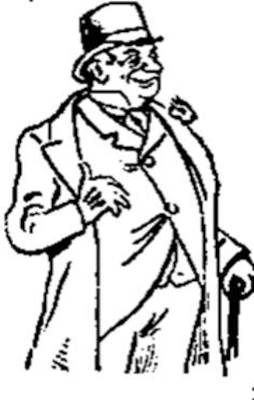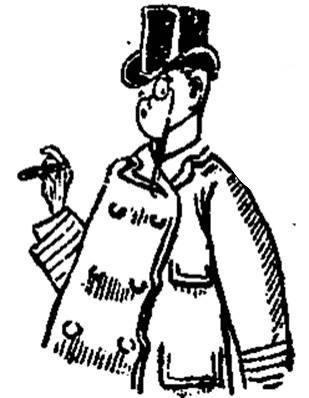This article has been transcribed from a copy of the Cardiff Times in the online collection of scanned Welsh newspapers 1804-1919 in the National Library of Wales, with grateful recognition of the free access accorded to all readers. Paragraph breaks have been introduced for easier reading.
In this article, alongside fashionable dress, Samuel uses some fashionable slang. 'Chappies’ were men about town, the word flourishing in the 1880s. He records ‘masherdom’, or the quality of being a ‘masher, which he elsewhere defines as 'describe the sort of young man who fancies that he can overcome and overawe everybody by the potency of his attractions': no. 47 'How to live within one's means' (12 May 1888). OED defines the word 'fribble' as a' trifling, frivolous person, one not occupied in serious employment, a trifler'. —— David Skilton

An individual who has wholly despised social conventionalities and is now doing 'five years' hard,' as a result.
OW dolefully conventional men and women are nowa-days to be sure. Look at the dress of the men — is there any room for the exercise of taste and individ-uality about that? What is the fate, do you think of the man who dares to despise conven-tionalism in his garb, and to appear in hab[i]liments which the custom of to-day has not approved? He may look as hideous as ever he likes in heavy gaiters, a stick-up collar that suggests an instrument of torture, a pair of trousers that are turned up at the bottoms, not because the pavement is dirty, but because a wholly insane fashion to that effect prevails – he may, in addition, sport a hat like an inverted sauce-boat, with a brim that is so narrow that it can scarcely be grasped by his finger and thumb, and yet no man will go out of the way to cast a stone at him; but let him endeavour to look like another pea out of the same pod – let him venture to consult his own individual tastes and to appear just a little less like all the other conventional 'Johnnies,' and he will at once be set down either as an eccentric and a likely candidate for an asylum, or as an egotistical ass who wants to look conspicuous. Look at all the young men of to-day in Cardiff, Swansea, and Newport, say, and note the dismal uniformity of type that prevails amongst them. An idiotic fashion is started and all of them follow it like a miserable flock of sheep, and not one of them has the moral courage or originality in his composition to hold aloof.

The illustrated conventionality of asking after the health of a man you particularly detest.
The same with the ladies. I gazed upon one style of garment oft repeated last summer till I was actually sick of seeing that wretchedly stereotyped clip, and I have begun almost to believe that the fair wearers must have been born in those garments – that those garments, in fact, are the common property of feminine human nature. Take as an example the cut-away jacket that all the younger ladies have been wearing the last 12 months. Originally a mannish smoking-coat in form, it has travelled through the whole realm of female humanity, and, with slight variations in its details of cut, has been hung out as a standing monument of the want of originality of the mantle-makers of to-day and of the lamentable adherence to a set form, instituted by someone else, prevalent nowadays in all classes of society. It does not at all matter that because the jacket suits 'A' perfectly it may fit 'B' very ill —'B' must have it because 'A' is always to the first style, and because 'C' and 'D' have adopted the same thing. The man or woman of to-day for the most part dare not actually -- with all our education and artistic culture — back his or her opinion against that of a grasping tailor or a fraudful milliner, but must needs rely upon the selfish and partial judgment of one or other of these delusive persons and must consent to be dictated to by them, greatly though their opinion would be despised upon any other point of taste. No wonder a modern crowd, even of the best-dressed people, has about it such a stiff and formal air — no wonder that it represents so few 'points' that can lend themselves to the socially descriptive writer. It is a crowd of tailor-led and milliner-made slaves to convention, who have not a particle of such pluck as will enable them to say 'I won't dress in what suits my friends, but in what pleases me.[']

Conventionalities, be hanged, sir; when you have got brass like me, you can be as unconventional as ever you like.
Conversationally the same rule applies. There is one really good talker in a million of young men nowadays. Anything like good consecutive sentences are almost unknown; conversation has become a disjointed series of scraps delivered in a drawl. The young man who dares to make any remark, the meaning of which is not instantly apparent to the unthinking creatures about him – the young man who ventures upon any remark likely to lead, say, to a little philosophical discus-sion is, amongst even the better class of young men in our towns, regarded as little short of a fool. These same young men have read many novels, but if you dare to hazard any conjecture as to motive and probable purpose of the several authors thereof you will find that they are wholly innocent of any thought beyond the mere story. Like children, they read a story because it is a story, or as they would read the record of Divorce Court proceedings in the evening papers. The stage is having an enormous run on their appreciation of late years, and especially that portion of it which displays as much of female nudity as possible. It is conventional for the young man of to-day to gush about the stage – and its female professors, who marry off better, take society all round, than any other class of women, probably because a greater part of their charms are on view for the benefit of probable bidder[s] than is the case with any other class of women.

A willing slave to the conventionalities of masherdom.
I was speaking of conventionalism in regard to modern conversation. Hear a lot of young men talking in a club smoke-room, and just mark how exactly alike they are not only in dictum but in thought as well. No doubt many of them would fain speak unstiltedly and yet with some degree of grammatical coherence were they desirous of keeping in with the rest and not seeming peculiar; but as it is they fall in with the manners of the vacuous horde about them, and talk about 'swagger suits,' 'good form,' 'chappies,'[i] 'bags,' and what not, in the way of disfiguring slang with the worst of modern foplings. Our wonderful language, it would appear, is not extensive enough so far as its vocabulary goes for the young man of to-day, so he ekes out the deficiency by using the verbiage of the music-hall, transmitted originally from the slums.
Links to other articles mentioning dress and fashion
- Samuel joins the Gay Throng
- Samuel Goes shopping
- Samuel on the Subject of Attire
- Samuel on Lady Killers
- Samuel on the Art of Dressing Well
- Samuel on Keeping Up Appearances
- Fashions of the 1890s for men and women (homepage)
Last modified 24 March 2022